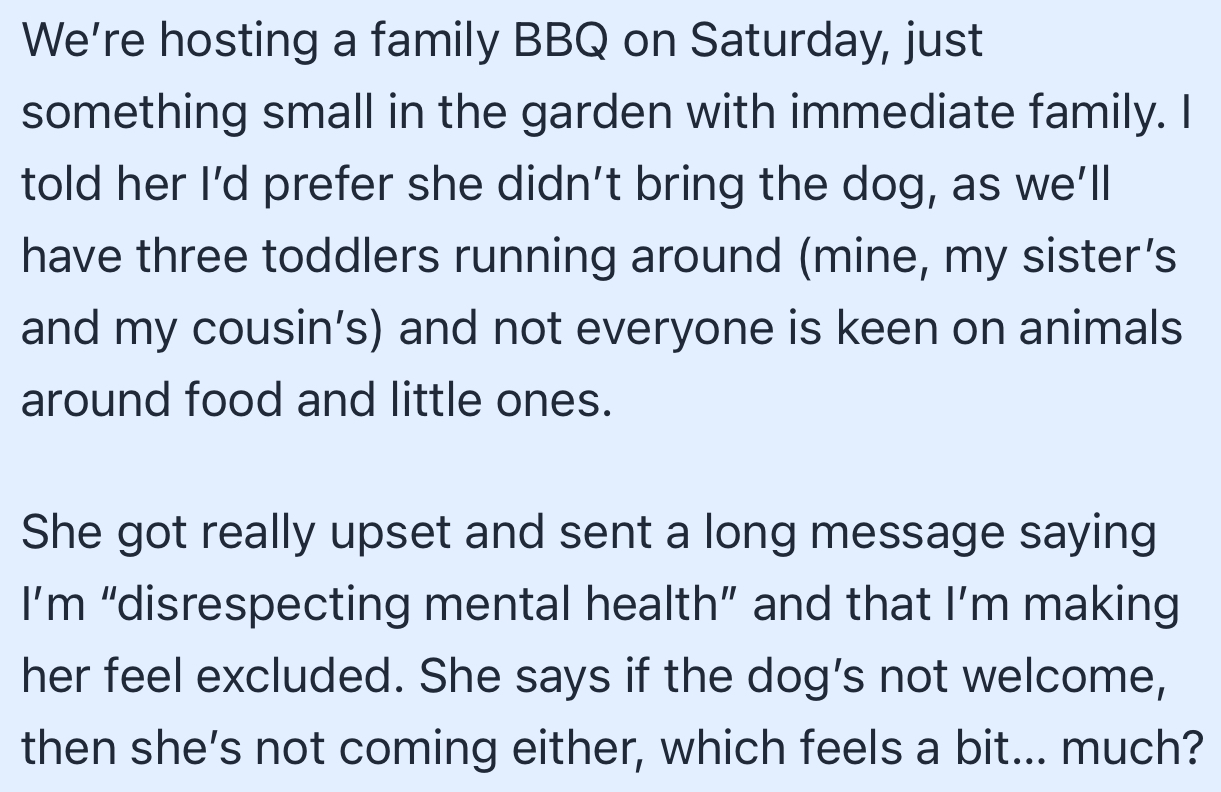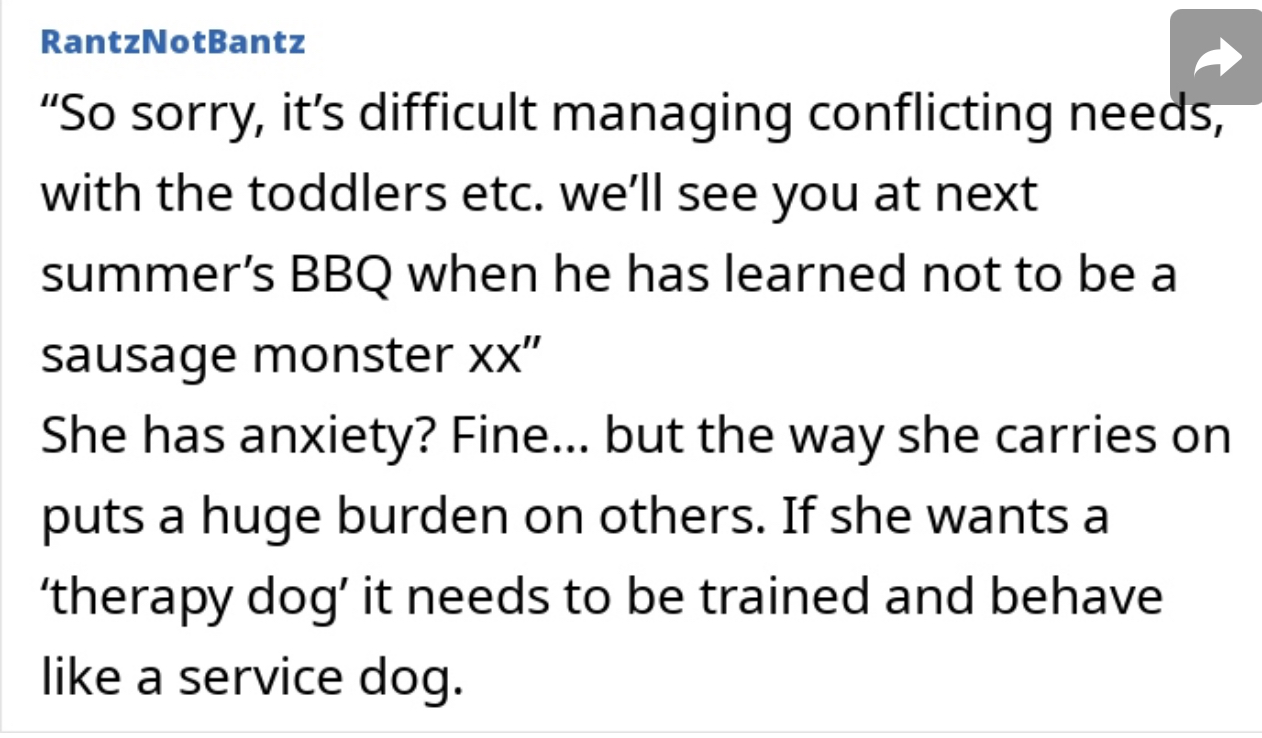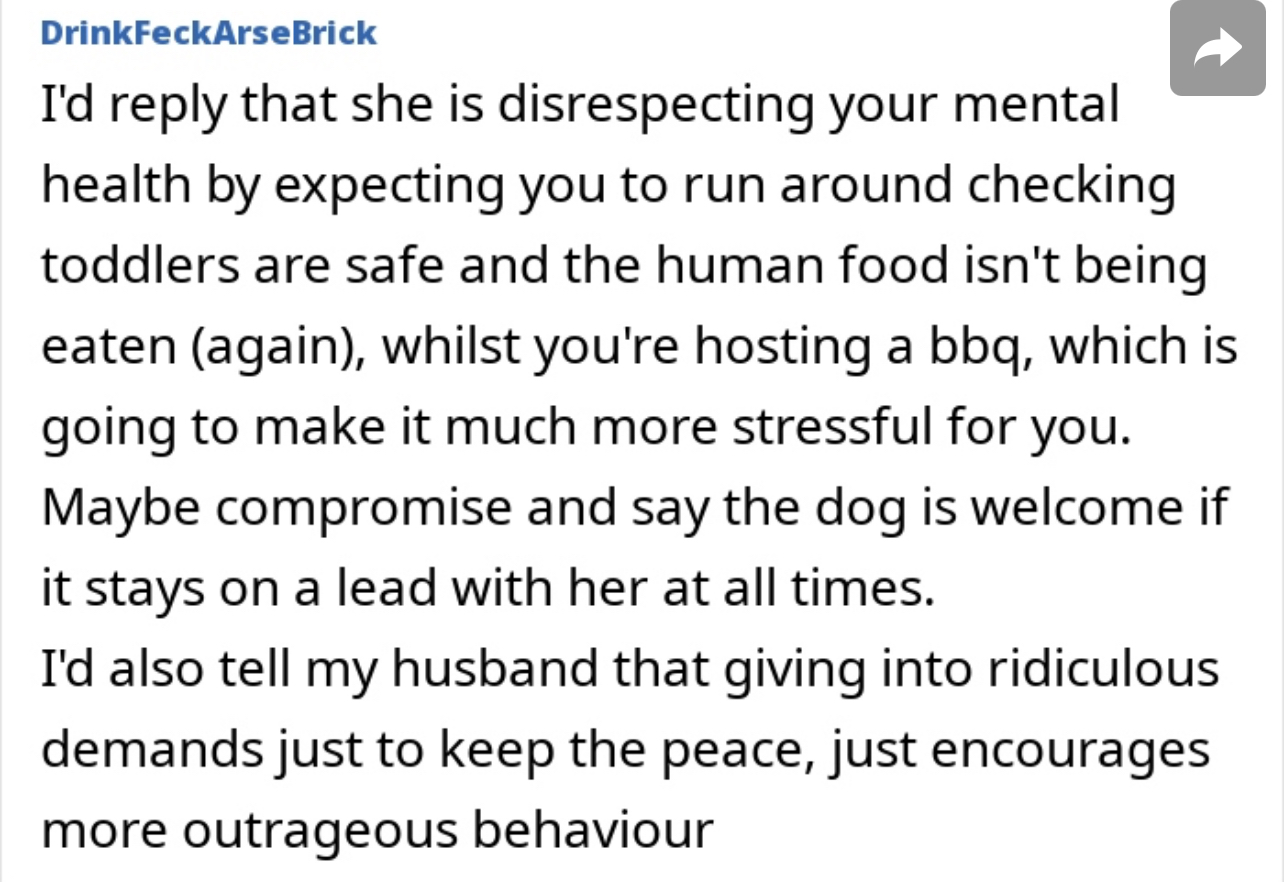Woman Bans SIL From Bringing Chaotic “Therapy Dog” To Family Barbecue, Gets Accused Of Disrespecting Mental Health
In a recent viral post, a woman (OP) shared the frustration of trying to host a simple family BBQ only to have it turn into a battle over boundaries.
Planning a backyard gathering should be straightforward… send out invites, prep some food, tidy up, and hope people show up on time.
But sometimes what starts as a casual Saturday afternoon can spiral into something you never prepared for.
This particular BBQ was supposed to be small and intimate. Just immediate family members gathering in the garden on a Saturday with three toddlers.
But OP had a problem she needed to address. Her sister-in-law (SIL) has become notorious for taking her dog everywhere she goes.
Apparently, SIL calls it her “therapy dog” because, according to her, it helps with her anxiety.
Now, some people may be thinking, ”But it’s just a dog, what’s wrong with bringing it to a family gathering?”…This dog has a bit of history.
In their last family event a few months back, it jumped on the table and ate sausages straight off the serving platter.
In addition, it spent the afternoon chasing kids and trying to get into the nappy bin, which SIL found amusing rather than concerning.
In preparation for this upcoming BBQ, OP mentioned to SIL that she’d prefer if the dog didn’t attend.
Unfortunately, SIL didn’t take the request well. She responded with a long message accusing OP of “disrespecting mental health” and making her feel excluded.
SIL went as far as saying that if the dog wasn’t welcome, she wouldn’t be coming either.
OP’s husband feels like she’s being too rigid with his sister, and has urged her to let it slide to avoid drama.
However, OP is standing firm, arguing that it’s not fair to stress about managing a hyperactive dog around toddlers and food just to make someone else comfortable.
Check out the full story below.
Let’s dig into the details

OP’s SIL has a habit of taking her dog anywhere she goes, including family events, which OP is not comfortable with

OP informed her that she wasn’t allowed to bring the “therapy dog” to the upcoming family BBQ

Understanding Emotional Responses
Dr. Michele Gelfand, a cultural psychologist, notes that family gatherings often bring underlying tensions to the surface, especially when personal boundaries are challenged. She emphasizes that these tensions can stem from differing beliefs about mental health and emotional support.
Gelfand points out that open dialogue about emotional needs is crucial. When families don't address these issues directly, misunderstandings can fester, leading to resentment. It’s essential to create a safe space for discussing boundaries, especially when it involves emotional support animals, as these can evoke strong feelings among family members.
Navigating Family Tensions
Family gatherings can become contentious when differing views on mental health and therapy animals arise. Dr. Barry Schwartz, a choice researcher, suggests that individuals need to recognize when their choices affect others. Schwartz argues that acknowledging the complexities of these choices can lead to more empathetic interactions.
By promoting dialogue around the emotional significance of therapy animals and the boundaries surrounding them, families can work towards a compromise. Schwartz emphasizes that fostering dialogue encourages understanding and lessens the potential for conflict, ultimately strengthening familial relationships.
One important thing to note is that this dog gave everyone a chaotic time in their last family gathering

Her husband thinks she’s being too harsh

Update

In family dynamics, it's common for certain behaviors to trigger emotional responses. Dr. Jonathan Haidt, a social psychologist, explains that these reactions often originate from our moral foundations. He suggests that when someone feels their values are being disrespected, it can lead to conflict and heightened emotions.
Haidt emphasizes the importance of empathy in navigating these situations. Understanding the emotional and psychological motivations behind individuals’ reactions can help families foster healthier communication. This not only aids in conflict resolution but also strengthens familial bonds in the long run.
A bit of context

More info

We gathered some interesting reactions

Setting Healthy Boundaries
To improve family interactions, Dr. William Doherty, a family therapist, advocates for clear boundary-setting. He suggests that family members should have a candid discussion about emotional needs and expectations before gatherings. This proactive approach can mitigate potential conflicts, especially regarding the presence of therapy animals.
Doherty emphasizes that it's essential to respect each other's feelings and preferences. Providing guidelines for what is acceptable can help ensure everyone feels comfortable and valued during family events. This not only creates a more harmonious atmosphere but also empowers individuals to express their needs openly.
“Cool she's solved the problem for you by saying she's not coming.”

“Maybe compromise and say the dog is welcome if it stays on a lead with her at all times.”

“But send her a message saying you expect the dog to be on a short lead at all times.”

Dr. Laurie Santos, a psychology professor, highlights the importance of understanding the psychological impact of therapy animals on mental health. While many individuals find comfort and emotional support from their pets, it’s crucial to recognize that not everyone shares the same sentiment. Santos points out that some may view these animals as disruptive, leading to family tensions.
Her research indicates that establishing clear communication about the role of therapy animals can foster a more inclusive environment. Families should consider discussing the animal’s role in advance to prevent misunderstandings and ensure a more enjoyable gathering.
“Send her a message saying you expect the dog to be on a short lead at all times.”

“I call attention seeking b*llshit. Don't pander to it.”

Setting boundaries about your own home isn’t out of the ordinary. OP has legitimate reasons for not wanting the dog there.
SIL, on the other is well within her rights to stick to her dog like glue. But she needs to understand that her rights stop when another person’s own begin.
If she can’t get the dog to behave itself, this probably won’t be the last time she’s banned from bringing it to a public gathering.
What do you think about this story? Let us know in the comments.
Research-Based Understanding
In summary, family gatherings can trigger emotional responses rooted in differing beliefs about mental health and therapy animals. Experts like Dr. Michele Gelfand and Dr. Jonathan Haidt emphasize the importance of empathy and open communication as tools for resolving conflicts. Setting clear boundaries, as recommended by Dr. William Doherty, can create a more harmonious atmosphere and empower family members to express their needs.
Ultimately, understanding these dynamics is crucial for fostering healthier family interactions. By implementing proactive communication strategies, families can navigate tensions more effectively and build stronger connections.



